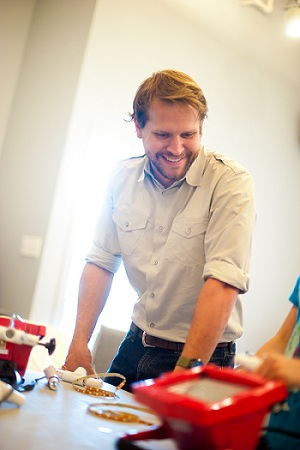
Name Josh Samson
- Education M.F.A., Film Studies, B.S., Mass Media Studies
- Target Audience Elementary School

Lights, camera, action! Making films isn't always about fame and fortune. For Josh Samson, making films a way to make a positive contribution to his community. Read on about what makes being a film instructor such a cool job!
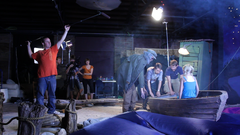 My main job is as a film instructor at Spy Hop, where I teach all different types of media in an after school program for teenagers aged 13-19. I am in charge of the fiction film and vocational film classes, and I teach 3 week workshops for areas ranging from making music videos to building your own film gear. I also teach a four month apprenticeship program that is kind of like an internship - students apply, get assessed and even earn a stipend to participate. My apprentices even get to work for actual clients in the community. I also teach a yearlong fiction class called PitchNic where I get to take students from the ground up through every aspect of production, from pre-production to post-production. Students have to work within a budget to rent gear, hire actors and produce a film to be showcased at the end of the year at a big red-carpet style event.
My main job is as a film instructor at Spy Hop, where I teach all different types of media in an after school program for teenagers aged 13-19. I am in charge of the fiction film and vocational film classes, and I teach 3 week workshops for areas ranging from making music videos to building your own film gear. I also teach a four month apprenticeship program that is kind of like an internship - students apply, get assessed and even earn a stipend to participate. My apprentices even get to work for actual clients in the community. I also teach a yearlong fiction class called PitchNic where I get to take students from the ground up through every aspect of production, from pre-production to post-production. Students have to work within a budget to rent gear, hire actors and produce a film to be showcased at the end of the year at a big red-carpet style event.
I also do video work for organizations on the side, whether I'm producing videos for fundraising or promotional videos for their website. I've worked on videos for gyms, internet ads, commercials, documentaries, and I've also been hired to work on fiction films in basically every type of technical role. If it's video related, I've probably done it.
I started out as a theater kid in grade school. I was a little hyperactive so my parents enrolled me in a theater class. I didn't have a video camera at the time but my friend did, so one day we picked it up and decided to make our own films. I started making really bad action movies when I was about 12 years old, and haven't stopped making movies since. Over the process of making those early movies they started to get a little better. I didn't use a computer to edit those films, but rather I used 2 VCR's - I played the footage on one VCR and recorded on another. I had one chance to get the edit right, so I started getting interested more in the editing process and all the other technical aspects of film. By the time I got to college and had to choose something to major in, and the only thing I had enough interest in was film. I didn't necessarily want to get an art degree in film because I liked studying the psychology of film and what you can do with it. I studied how all media impacts society, with a specific emphasis in film.
I usually show up in the morning and work on editing the projects we have going on at the time, whether it be an outreach video for Spy Hop or a client project that the students didn't quite finish. After school has let out I am either teaching a class or helping students with their projects.
I love having the opportunity to do something with filmmaking. With our after school programs I have a chance to make a positive impact in someone's life. Not everyone who takes our film classes is going to end up with a career in filmmaking, but our programs go a long way to increase their confidence and social skills. We see a lot of changes in self-esteem and a willingness to take creative risks with the students who take these classes and they get to meet other students from other parts of the valley that they never would meet otherwise. We teach students how to work in a group, how to set a goal and how to reach it. I am affecting positive change through film in a different sense than most other film makers. People don't actually have to watch the movies that I make in order for me to have made a positive impact on someone's life, which is pretty unique.
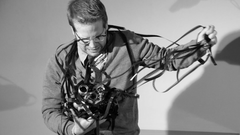 Film making uses just about every type of technology you can imagine. The technology is the support that allows the film makers to create something for people to watch and enjoy. Basic computer skills are a must for writing and editing films and there is also a lot of technology surrounding the camera. You have to know about the digital technology of the camera, all the different types of lenses, different shooting formats, how to shoot on multiple types of cameras and how they work together. You also have to learn a lot about editing technology such as the different types of editing platforms and interfaces, and how to transfer things in and out of the computer. Every few weeks there is a new technology to learn.
Film making uses just about every type of technology you can imagine. The technology is the support that allows the film makers to create something for people to watch and enjoy. Basic computer skills are a must for writing and editing films and there is also a lot of technology surrounding the camera. You have to know about the digital technology of the camera, all the different types of lenses, different shooting formats, how to shoot on multiple types of cameras and how they work together. You also have to learn a lot about editing technology such as the different types of editing platforms and interfaces, and how to transfer things in and out of the computer. Every few weeks there is a new technology to learn.
Storytelling is arguably the most important part of filmmaking, and that is more of the artistic side of what I do. Camerawork is very artistic and a filmmaker has to be able to use the elements of composition to affect the psychology of how they film their scenes. There is also an artistic side to the editing process. Basically you are pushing buttons and clicking a mouse when you edit, but the artistry comes about by deciding when and where to push the buttons. Film making is one of the only art forms that wouldn't exist without technology.
Yes - it was the first time I picked up a camera. It took a few years after I started acting for me to actually pick up a camera and make a film, and once I did I stopped theater acting. I liked the instant gratification of filming something - you only have to perform it once and then you can watch it over and over. The first project that I worked on, as bad as it was, made me realize that all the things that I loved to do - writing, acting, music, filming -could all be combined in one medium.
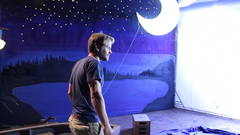 There are a lot of people who get film degrees, so the competition in this field is very high. There are always 10 people waiting in line behind you if you can't get the job done. It was also a challenge to figure out which niche I fit into - with all the technology I have learned over the years I could work on TV, films, animations, educational videos, etc. Picking a sub-genre of film was really tricky for me and I still bounce around quite a bit.
There are a lot of people who get film degrees, so the competition in this field is very high. There are always 10 people waiting in line behind you if you can't get the job done. It was also a challenge to figure out which niche I fit into - with all the technology I have learned over the years I could work on TV, films, animations, educational videos, etc. Picking a sub-genre of film was really tricky for me and I still bounce around quite a bit.
For most people the hardest thing to do is make a living by being a filmmaker. Carving a path into this career is the most challenging but also the most rewarding aspect of this field. No one hands you anything, so you have to really work for it and make your own connections.
For the most part I was self-taught by playing with cameras, but my original acting teacher, Tom Beard, helped to open my mind to try different things. We used to do silly little acting exercises (anyone who has taken acting classes will know what I'm talking about) and he really freed the creative part of my brain. My parents were also very supportive. One of the first big gifts that my parents gave me was a camera. They always wanted to make sure that I could pursue my interests, so when I decided to study art in college, they didn't give me the chat that a lot of people got about what I would do with an art degree, even though I ended up getting a science degree. My parents were both public servants- my dad was a police officer and my mom was a teacher - and they always wanted my brother and me to follow our passions. They were and still are unbelievably supportive of us.
Go out and shoot a movie! There is so much technology out there that is pretty cheap. Even if you have next to no money you can go out and get a camera. It doesn't matter if it isn't the best camera in the world because it gives you an opportunity to see the world from a different viewpoint. Let your creativity run wild. Don't be afraid to be the kid running around in a cape, because it really frees that creative side of your brain. It is also really important to accept the lessons of science. The problem solving skills that you learn in science class are very important in film making. When making a film you are problem solving all day long.
Also, see if you can find a youth media organization, like Spy Hop, in your community and take a class. These classes are very fun and will introduce you to other kids your age who are also interested in film. Filmmaking is a collaborative art and it is almost impossible to make a film by yourself. Most youth media organizations are nonprofit organizations, so the classes probably won't be very expensive and they offer hands-on experience with experienced professionals to give you the tools and resources you need to bring your ideas to life.
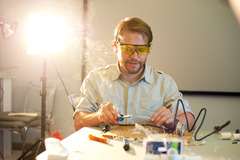 Film is constantly evolving, and it isn't going away. It is an industry that is over 100 years old, and is one of the widest reaching forms of mass communication and entertainment. The internet is, however, changing the way people watch film and television, and there are many more channels and opportunities for work to get out there. More and more independent films are popping up because the growing technology is making it easier and cheaper for people to make films that look good. If you blink in this field you are going miss the many changes that are happening, so it is important to keep up with technology.
Film is constantly evolving, and it isn't going away. It is an industry that is over 100 years old, and is one of the widest reaching forms of mass communication and entertainment. The internet is, however, changing the way people watch film and television, and there are many more channels and opportunities for work to get out there. More and more independent films are popping up because the growing technology is making it easier and cheaper for people to make films that look good. If you blink in this field you are going miss the many changes that are happening, so it is important to keep up with technology.
Why did you choose your major? Did you always know this is what you wan…
Lisa Ingham excels on the field and in the classroom as an Engineering …
Why did you choose your major? Did you always know this is what you wan…